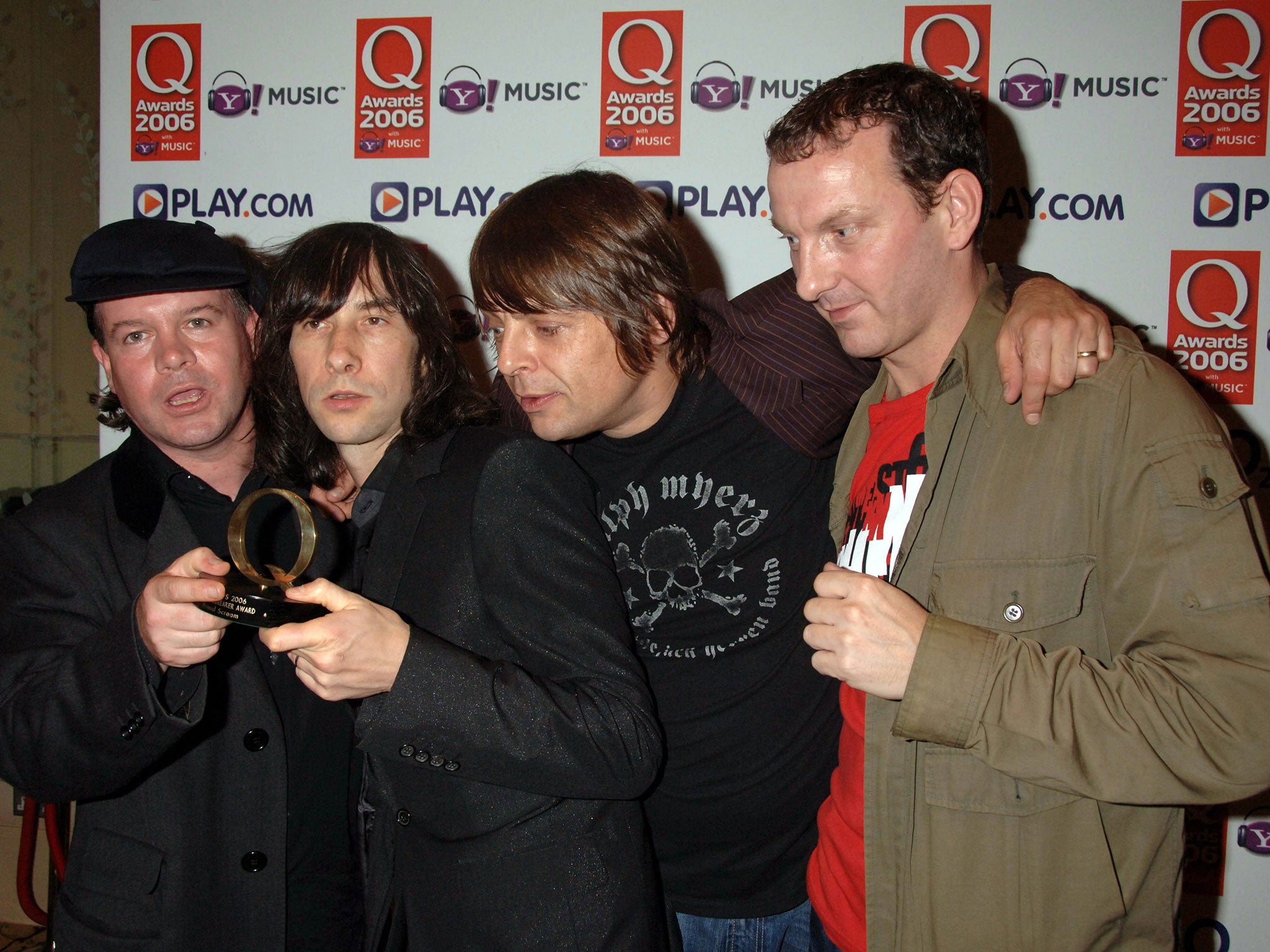Robert Young: Primal Scream guitarist who summed up their potent and hedonistic fusion of punk, psychedelia and the rave culture
‘He can get a tune out of anything,’ said Bobby Gillespie

Robert “Throb” Young played guitar on the most influential British LP of the 1990s, Primal Scream’s Screamadelica (1991). He is the dominant figure on its inner gatefold sleeve, sitting on a Persian rug, legs crossed and eyes closed, looking lost in music as he strums a sitar. The band’s singer, Bobby Gillespie, sits next to him, resembling a member of the Velvet Underground. Both are bathed in red light, as an ecstatic musical happening occurs around them. The photo sums up Screamadelica’s splicing of late Sixties psychedelic values and sounds with those of the then-dominant rave scene, and Young’s role at the heart of this.
Young met Gillespie soon after the latter’s family moved in 1973 to the Mount Florida area of Glasgow, near Hampden Park football stadium. Young, Gillespie and Alan McGee, later the future boss of Primal Scream’s label Creation Records, all bonded over punk rock and football at the local Kings Park secondary school. “Robert was this little kid who loved fighting,” McGee remembered. “He was the kind of kid you had to watch, ’cause even though he was small he was really bolshie.”
Gillespie pursued his punk obsession beyond school, playing his first gig as drummer for Scottish feedback-provocateurs the Jesus And Mary Chain in Glasgow on 11 October 1984. Gillespie was also in the support band, Primal Scream, which he considered to have properly begun that night. Young was its only other constant member for the next 22 years. “I used to make Robert punk T-shirts and tapes when he was 10,” Gillespie once said. “That’s why we’re still together.”
Primal Scream’s 1986 B-side “Velocity Girl” appeared on that year’s NME C86 cassette, unwillingly bracketing them with the twee indie “shambling” scene. Despite the addition of another Scream linchpin, Andrew Innes, on rhythm guitar, their pallid debut LP Sonic Flower Groove (1987) didn’t help. The trio moved from London to Brighton and Young switched from bass to guitar for Primal Scream (1989), but its Stooges-style punk mayhem was also derided by the music press.
A 1988 Brighton rave that introduced Gillespie to the acid house scene and its drug of choice, Ecstasy, saved Primal Scream. Social connections made at raves led to DJ Andrew Weatherall remixing the Primal Scream ballad “I’m Losing More Than I’ll Ever Have”. Weatherall reworked elements including its house-style piano, and added a sample of a rebellious Peter Fonda from the biker film The Wild Angels (1966), resulting in the 1990 Top 20 single “Come Together”.
The following year’s album, Screamadelica, combined moods of euphoria and comedown, and the sound of acid house with Rolling Stones-style, strung-out country-rock. The dance-rock fusion developed by the Stone Roses’ single “Fool’s Gold” (1989) achieved its perfect balance here. If any rock LP defined the so-called Second Summer of Love generation, this did.
The effect on Young was equally profound. Band associate Tim Tooher remembered “an 18-month high” leading to Screamadelica, in which the group’s musical values and chemical intake radically changed. “Most affected was Robert,” Tooher recalled. “Where before there had been a poised, careful and cool bass-player, now there was an embryonic guitar hero. The guitar set him free. Robert will die for rock’n’roll, even if he lives to be 100 years old.” Although Gillespie and Innes were Primal Scream’s songwriting core, Young was often pictured by the singer’s side, visually offering classic, black-leather-wearing rock’n’roll attitude, much as Peter Hook did for New Order.
The downside of the hedonism now inseparable from music-making for Primal Scream hit quickly. Screamadelica’s follow-up, Give Out But Don’t Give Up (1994), was recorded in Memphis in part to distance the band from the heroin habits they’d developed in London. Though the album was a backwards step it did allow Young to play slide-guitar alongside some of Southern rock’s greatest musicians.
But an infamously debauched US tour with Depeche Mode saw Young running up a £260 champagne bill in Atlanta on his own. Weatherall recalled an already intoxicated Young’s reasoning while ordering a pint of Jack Daniels and coke before an earlier gig. “I’m in a fucking band, I can ask for stupid things – don’t you get it?” Primal Scream almost fell apart before every subsequent album over the next dozen years as personal excesses took their toll. That didn’t stop them making Vanishing Point (1997) and XTRMNTR (2000), which brought in darker, heavier dub and German kosmische rock influences, and nearly equalled Screamadelica for experimental thrills.
Young divorced his first wife Jane, with whom he had two sons, Brandon and Miles, around the time of Vanishing Point. He finally left Primal Scream after the lacklustre Riot City Blues (2006). “He has some personal problems and he’s dealing with them,” Gillespie explained. “He did play amazingly on the album – he can get a tune out of anything.” Gillespie lost touch with his old schoolfriend, who lived with his second wife, Rachel, in the Scream’s old stomping ground, Hove. Gillespie speculated that Young had stopped making music. But after his death was announced, he was remembered by old comrades in partying and creativity with universal warmth.
Robert Young, guitarist and bassist: born 1965; twice married (two sons); died Hove 9 September 2014.
Subscribe to Independent Premium to bookmark this article
Want to bookmark your favourite articles and stories to read or reference later? Start your Independent Premium subscription today.

Join our commenting forum
Join thought-provoking conversations, follow other Independent readers and see their replies